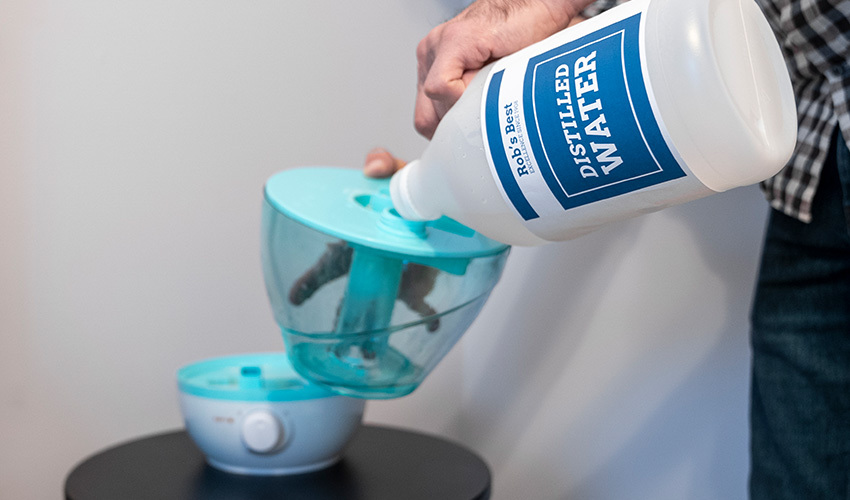Can You Use Tap Water in a Humidifier?

As indoor air quality experts, we’re frequently asked: can you use tap water in a humidifier? The answer is yes – but you might not necessarily want to. Tap water can cause unnecessary wear and tear on your humidifier and potentially spread unwanted bacteria throughout your home. Keep reading to learn about what type of water we recommend using in your humidifier.
Why Invest in a Humidifier
Humidifiers are excellent additions to most homes. They make our living spaces more comfortable by adding moisture to the air. Dry air can be harsh on the lungs of those with allergies and asthma. That’s especially true during the winter months. Humid air naturally feels warmer, too. You may be able to turn down the thermostat a few degrees and not notice a big difference in comfort. This inevitably leads to more affordable heating costs. Of course, the success of the device often lies with what water to use in the humidifier.
If you decide to add a humidifier to your home, be sure to learn how to clean it properly. Mold can grow quickly in these devices, which is why they should be thoroughly cleaned at least every other day. While this extra chore may sound annoying, you’ll be glad you invested a little time in maintaining your humidifier. When cleaned regularly, humidifiers can have a lifespan of several years.
What Type of Water Should be Used in a Humidifier?
So, can you use tap water in a humidifier? While you technically can; it’s not recommended. Instead, look for demineralized, distilled, and purified water at the store. This kind of water is less likely to result in mold and bacteria growth inside your humidifier. You’ll have less mess to clean up when maintaining your humidifier, and you won’t risk sending mold spores airborne. This means there’s a much lower risk of developing lung infections, too. All in all, it’s best to avoid tap water so you can sidestep these potential issues.
Can I Use Bottled Water in a Humidifier?
Bottled water is truly the best water to use in a humidifier. Not all bottled water is ideal, though. While bottled water is filtered, some minerals inevitably remain. This can present many of the same issues caused by tap water. Look for bottled water that has been distilled. This is the best way to ensure that no mold or bacteria will grow inside your humidifier.
What About Boiled Tap Water?
Boiled tap water is much better than tap water in a humidifier. Boiling can remove bacteria from the water, but it doesn’t remove the minerals. Actually, boiling water increases the mineral content. As steam evaporates, the mineral concentration rises. While distilled water is made from boiling water, distilled and boiling water are two different things. Distilled water is made by collecting the steam vapor from boiled water. Boiled water is simply heated and collected.
Using boiling water is better than tap water since it will have a lower chance of mold formation. Boiling water neutralizes mold spores, so you’ll have fewer issues cleaning and maintaining your humidifier. If you opt to use boiled water in your humidifier, make sure to let it cool before using it. Putting boiling water in a humidifier can damage it. Instead, allow boiling water to come to room temperature before adding it to your humidifier.
Breathe Easy with Indoor Air Quality Solutions from Aire Serv®
For better or for worse, humidifiers can really impact indoor air quality . Knowing what water to use in a humidifier can make all the difference. Tap water ups the odds of mold growth and lung infections, while distilled water makes your home feel warmer and more comfortable. The difference is obvious. The next time you need to refill your humidifier, be sure, you’re doing so with distilled water.
Need help with a whole-home humidifier? Or perhaps you want additional solutions to improve your home’s indoor air quality. The experts at your local Aire Serv can provide insight and options for doing so. Call us or request an appointment today.
 Click to call
Click to call


